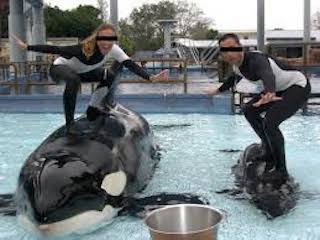What are we looking at in the image above? SeaWorld might want you to think of it as Education, and as an ongoing effort to learn more about orcas so as to promote their Conservation. Those descriptions are as absurd as they are disingenuous. Obviously, what’s going on here is as far away from these things as it’s possible to be. At best, they might convince you to think that the word to describe this is Entertainment. That is, if you’re willing to overlook a whole bunch of other things that are equally evident.
Words matter, including our choice of terms when we wish to accurately describe a given situation. Let’s call this what it is. Certainly these orcas would never willingly make the choice to participate in this activity. This image depicts abuse and exploitation by any definition. Using another person like an inanimate surf board is theatrics of the cheapest kind, intended to delight the most ill-informed type of paying customer. To the victims it’s what you have to tolerate in order to get fed. We could certainly say that the behavior of these trainers is disrespectful and humiliating to the orcas involved. It’s being willing to deprive other persons of their dignity in order sell tickets.
But is it slavery? Is that word – so laden with historical significance – an accurate description of what we’re looking at here? Indeed of all cetacean captivity? Well, unfortunately the answer is yes. But why have we at CCA chosen to try to avoid the use of that term in most instances, in our defense of whales and dolphins? In short, because we don’t want to shut down a tremendously important conversation before it even begins.
No Offense Intended
When we use the term slavery, what do we mean? The word, along with genocide or The Holocaust, refers to the absolute worst humans have ever done to one another. It means that a person is held in a state of captivity and denied the freedom to choose which actions they can take, how they can invest their time, or even to make decisions with regards to the disposition of their own bodies. Those elements are all present in the case of cetacean captivity. As is the fact of literally being owned by someone else.
It’s all there, except that what is not universally understood (or even widely understood) is the fact that when we are talking about cetaceans, we are talking about persons. We are a long way from most people accepting this, though our culture is clearly moving in that direction, and surprisingly quickly. One day we’ll get there, but it will take some time.
Because some of us believe unequivocally that dolphins should have personhood rights, it seems perfectly natural to use a term that describes the complete obliteration of those rights by the practitioners of captivity. I’m with my colleagues at CCA and other similar organizations on this point – I believe that the notion that you can ‘own a dolphin’ is ridiculous and morally indefensible. One day our laws will agree. But not today.
But before we can even have that conversation, we cannot simply alienate a great many people who care passionately about justice, compassion, and the human condition. We risk giving offense by appearing to trivialize the most grievous injustices that have ever been committed against our fellow human beings. And many of the people we’re most likely to offend are among those very likely to align with us on the issues we care about. People for whom empathy and concern are the more likely responses when eventually becoming aware of the true nature of these beings we want to help. When confronted with the reality of what captivity is really like for such beings, these will be much needed and valuable allies.
People less likely to turn away in the face of others’ suffering are precisely the kinds of people we want to be engaging with. So let’s focus on communicating a picture of captivity which is as accurate as we can make it. Of what the experience of life in a concrete tank is like for someone possibly as complex and cognitively sophisticated as ourselves. But let’s resist the temptation to use a term like slavery. By raising awareness we can let thinking, reasonable people decide that for themselves.
In time, I believe that our research will bear out what observations to date clearly suggest regarding the nature and intelligence of cetaceans – dolphins in particular. With this recognition many more of us will find it normal and self-evident that captivity ought to be described as exactly what it is – immoral, exploitative, and yes, slavery.
For The Orca’s Voice,
Phil, Canadian Cetacean Alliance



Leave a Reply